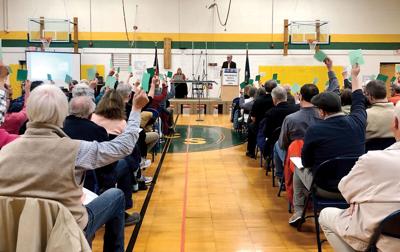The Champlain Valley School District’s budget was voted down Tuesday night, throwing the financial future of the state’s largest school district into question.
Just over 5,000 votes were cast against the district’s $105.8 million budget, with 3,391 votes in favor. The vote will almost certainly force the district to consider measurable cuts to programs and faculty to reshape next year’s school finances.
It’s a gut punch to a district that has been severely disadvantaged by recent changes to the state’s education finance system.
Board members and administration officials will likely first look to cut support positions in the district that, in previous years, were funded through federal COVID-19 relief funds, called ESSER funds.
District officials, when finalizing the budget in recent weeks, made a point to fund 17 of the 24 federally funded positions that they deemed critical — special education support staff, para-educators, English language specialists, academic and behavioral interventionists, school counselors and socials workers among them. Those may now be at risk.
Voters did approve a $3.6 million bond Tuesday night, meant to complete infrastructure projects that were already bonded in 2022 but, because of inflation and supply chain issues, have grown well past previous estimates.
But with Tuesday night’s budget results, more than $1.5 million in one-time expenditures for capital projects in schools for the coming year may now on the cutting floor. School infrastructure needs across the state are becoming problematic, and without state aid, the cost is borne by districts and local taxpayers.
The question is whether district officials will trim anywhere beyond that. District officials have previously noted that cutting only the 17 support positions and eliminating the one-time infrastructure spending would still leave taxpayers with a double-digit tax rate increase under the state education system.
The budget that was voted down had already eliminated five teaching positions in the district, Meghan Metzler, the board’s vice chair, noted earlier.
“It’s a disappointing outcome but certainly not altogether unexpected,” board chair Angela Arsenault said.
The district, she said, has been planning for this outcome and will meet Tuesday, March 12, to look at an amended budget that administrators and board members have been working on.
The second budget, Arsenault said, will be an attempt to responsibly trim the budget as much as they can “before we start seriously impacting our ability to maintain the high-quality education and class sizes that our voters and community have always said they wanted.”
Champlain Valley’s budget is among a handful that have been voted down across the state — South Burlington’s included. State officials have said property taxes were set to rise by an average of 19 percent across the district, and the Champlain Valley’s estimated rates were no different.
The district faced an average of a 19 to 26 percent tax rate increase. But those estimates ranged from town to town based on the common level of appraisal figures, or the calculation that compares the assessed value of properties on the grand list to the actual property sale prices considered to represent fair market value.
Because the housing market has skyrocketed in years since the pandemic, with home sale data continuing to rise by high single or low double digit percentage points amid a low-supply market, towns’ CLA figures have seen dramatic decreases, even after conducting town- or city-wide reappraisals.
Administration officials and board members had seen a financial cliff coming since 2022, when the Legislature passed Act 127, a new layer to the state’s education formula that tried to correct what researchers showed was an insufficient pupil weighting system for low-income students or non-English speaking students.
To soften the blow, the law allowed for a 5 percent tax rate “cap” through fiscal year 2030, as well as a 10 percent per-pupil spending limit. The often-perplexing formula meant that whether the Champlain Valley School District, for example, approved an $88.5 million budget or a $105.8 million budget would have no difference in its $1.37 tax rate increase.
District officials had estimated a roughly 18 percent increase for member towns under that formula.
But lawmakers, in the 11th hour, decided to eliminate that cap on property tax hikes, arguing that districts across the state were taking advantage of the law and were making a huge draw on the state’s education fund.
H.850, passed two weeks ago, changed the already complex formula, but allowed for districts to postpone their budgets to April to make cuts.
District officials opted not to make any changes and move forward with the budget they had warned prior to the law change.
Any changes to the budget would start to “take away some of those really important supports for our students,” Metzler said. “We would have to cast a wide net to look at operations, finance, what happens in buildings, etc., but we would have to start making cuts to things that support our students in many different ways.”
Metzler added they chose not to postpone their budget — which was crafted under previous Act 127 rules — because “it reflected what we felt were the needs of our students in the environment that we’re in.”
But under the budget, member towns would have been walloped by double digit tax rate hikes. Hinesburg would have been hit the hardest, with anywhere from a 23 to 30 percent hike, officials said, while Charlotte would have faced a 21 to 28 percent hike and Shelburne a 19 to 27 percent hike.
Residents in the district’s five member towns — Williston, Hinesburg, Charlotte, Shelburne and St. George — balked.
Bill Baker, a Hinesburg resident and former member of the Champlain Valley School District, told the board he would not be supporting the budget but not because of the district’s actions: “We got to tell the state we can’t take it anymore,” he said.
Carl Fowler, of Williston, calling the potential tax rate hikes “titanic,” said the implications of spending statewide this year are “potentially devastating on taxpayers.”
“It would normally be my inclination to vote for that tax, but this time it strikes me that if we vote now for the proposed school budget,” Fowler said, “we are in effect saying that irrespective of what the Legislature does, we will live with what we say we will vote for, and that sends a message to the Legislature not to proceed to try to revise the tax situation, or fix the problems with the law.”
The district will now have to rework its budget and a revote will have to be scheduled sometime after April 6. Where cuts would be made are unclear.
During the board’s Feb. 20 meeting, when members opted not to postpone the budget, officials questioned what affects any changes would have on the district’s educational standards.
“What I’m struggling with is I just don’t know if we can make an impact to the tax rate without completely redoing how we deliver education to our children,” board member Brendan McMahon said.





















(0) comments
Welcome to the discussion.
Log In
Keep it clean. Please avoid obscene, vulgar, lewd, racist or sexual language.
PLEASE TURN OFF YOUR CAPS LOCK.
Don't threaten. Threats of harming another person will not be tolerated.
Be truthful. Don't knowingly lie about anyone or anything.
Be nice. No racism, sexism or any sort of -ism that is degrading to another person.
Be proactive. Use the "Report" link on each comment to let us know of abusive posts.
Share with us. We'd love to hear eyewitness accounts, the history behind an article.